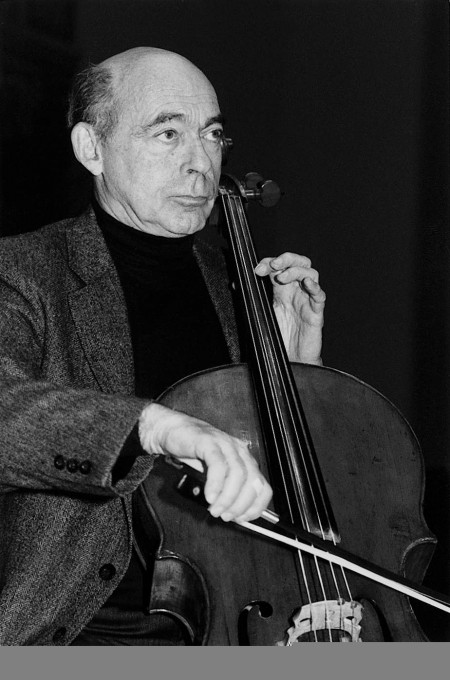
‘I tend to believe that I am rather a teacher than a performer based on my temperament. In my opinion, teaching is a lot more important than the concerts because what I do as a teacher has an impact for generations. I always try to create and follow tradition at my concerts and to do so as it would leave trace in the history. Probably my trademark is that I consider historic importance more than what happens tomorrow.' The one who comments like this is one of the most significant cellists of our century. A soloist career of six decades and almost a hundred of recordings hallmark his artistry and that is reasonable to presume: if teaching and tradition have such importance for him, he might come from a school where he absorbed experiences from both for a lifetime.
János Starker was born in 1924 in Budapest. His talent was recognized at an early age: he attended the preparatory classes of the Academy of Music from 1933, although he did not earn a degree because he left out of school after the second academic year in 1940. His teacher was Adolf Schiffer from whom he could take the heritage of the cello school deriving from Popper at first hand. Besides Schiffer, the chamber music-teaching of Leó Weiner left deep impact on his musical thinking. When he writes about his master it is like he would summarize his own teaching ars poetica: ‘Weiner taught us to hear and helped us to recognize the means of music making. He taught us that every note counts in music. He taught that discipline the primary expectation of which is to respect the intentions of the composer and our personal interpretative thoughts may come only after that. He made us aware of the importance of the direction of the accents, factors of rhythm, breathing, agogics, the changes of meter and pulse. He raised the internal need for the ideal legato and the execution of ascendant and descendent melodic lines in us. He helped us to understand the necessity of building climaxes and low points. He required the clarity of sounding, the simplicity of expression and the balanced structure.' The infinitely conscious and nuanced music making which is pictured in his remembrances became also an ideal of Starker. It was not by accident then that one of his critics wrote: ‘János Starker remains to be the unsurpassed aristocrat of cello playing – serious and disciplined, showing icy cold outwards while such a fire burns inside him that seems to flame from the first stroke of the bow.'
He performed the Solo Sonata of Kodály on June 1, 1939, - while still studying at the Academy - that composition, the unparalleled masterly performance of which had been tied to his name for decades, and which he preserved in sound recordings several times. Sándor Jemnitz reported from that student recital as: ‘As he prepares for the wide melodic lines of the first movement, the young body is shaking. It is not shaking from everyday weak stage frights but because of the staggeringly premature emotions of empathy and willingness to measure up. The internal world of the real artist moves already in this boy and no particular gift of prophecy is needed to predict that this internal world is going to employ us many times.' The promising start of the career was broken by the persecution of the Jews and the young Starker was confined to the public of the Hungarian State Hebrew Cultural Association. He became solo cellist of the Opera in 1945/1946 and had opportunities for appearances as a soloist.
He left the country in 1946, lived in Paris for a while then settled in the United States in 1948. He had been playing in orchestras for a decade and decided to take on a solo career only in 1958. It is impossible to summarize the stages of his career briefly: his recordings won a number of prizes, his tours took him to all continents. He appeared with the most prominent orchestras and most outstanding conductors; his name is mentioned among the most prestigious soloists of the past decades. He was greeted with a festival on his 75th birthday at Kronberg, near Frankfurt, the book which was published on that occasion (Von Budapest nach Bloomington) presents his work in the environment of the Hungarian cello school.
Although he returned to Hungary for the first time only in 1971, his native country and even more the company of his musician colleagues raised on the same traditions accompanied him uninterrupted. He played at the Dallas Symphony under Antal Doráti; and Frigyes Reiner invited him to the Metropolitan Opera and to Chicago; Miklós Rózsa wrote a cello concerto for him; he appeared with György Szoltsányi in Paris; while György Sebők was his faithful friend and pianist partner for a lifetime. He maintained close friendship with numerous emigrant musicians as Éva Czakó-Janzer, László Varga, János Scholz, Viktor Ajtai or Róbert Gerle. His home has been Bloomington, Indiana from 1958, where he has been devoting all his free time to teaching for more than four decades. Hundreds of his students carry on that musical tradition perhaps without suspecting that its roots date back to the far Hungary.
H. P.


